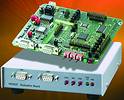Evaluation kit for H8/3052BF 16 bit flash microcontroller
12 September 2001
Analogue, Mixed Signal, LSI

Hitachi has released a new evaluation kit for the H8/3052BF microcontroller. The EVB3052F kit comprises all the necessary hardware and software to enable the full evaluation of the 16 bit 512 KB flash microcontroller which is based on the H8/300H CPU core.
The EVB3052F includes an evaluation board in a solid metal case, an RS232 cable and manuals for the H8/3052BF, the board and accompanying software. The software suite contains the Hitachi embedded workshop (HEW) build environment, demonstration versions of relevant C compilers, the Hitachi debugging interface (HDI-M) and a flash development toolkit (FDT).
The Hitachi embedded workshop is a 32 bit flexible code development environment for applications using Hitachi microcontrollers. Designed for use with Windows 95/98/NT and 2000, the HEW range supports the full list of H8/300, H8/300L, H8/300H, H8S and SH microcontrollers, all functioning under a common GUI front-end with adaptations for the various toolchains.
The evaluation board is connected to the detachable FDT which can be used together with customer hardware to allow full control of on-chip and on-board flash programming. The board also provides flash programming routines in source code which can be re-used by the customer for their specific application. The EVB3052F requires a 5 V d.c. power supply delivering 600 mA.
Avnet Kopp
(011) 444 2333
[email protected]
www.avnet.co.za
Further reading:
Online sensor technology hub
Analogue, Mixed Signal, LSI
Mouser’s sensor content hub offers an extensive collection of articles, blogs, eBooks, and product information from its technical experts and leading manufacturing partners.
Read more...
Ultra-low power MEMS accelerometer
Altron Arrow
Analogue, Mixed Signal, LSI
Analog Devices’ ADXL366 is an ultra-low power, 3-axis MEMS accelerometer that consumes only 0,96 µA at a 100 Hz output data rate and 191 nA when in motion-triggered wake-up mode.
Read more...
BT Audio 4 Click board
Dizzy Enterprises
Analogue, Mixed Signal, LSI
The BT Audio 4 Click board from MIKROE provides high-quality wireless audio streaming and data comms over Bluetooth.
Read more...
Precision MEMS IMU modules
Altron Arrow
Analogue, Mixed Signal, LSI
The ADIS16575/ADIS16576/ADIS16577 from Analog Devices are precision, MEMS IMUs that includes a triaxial gyroscope and a triaxial accelerometer.
Read more...
MEMS with embedded AI processing
Altron Arrow
Analogue, Mixed Signal, LSI
STMicroelectronics has announced an inertial measurement unit that combines sensors tuned for activity tracking and high-g impact measurement into a single, space-saving package.
Read more...
High-performance IMU
RS South Africa
Analogue, Mixed Signal, LSI
TDK Corporation has announced availability of the new InvenSense SmartMotion ICM-536xx family of high-performance 6-axis IMUs.
Read more...
High-temperature closed-loop MEMS accelerometer
RS South Africa
Analogue, Mixed Signal, LSI
This sensor from TDK is a high-temperature MEMS accelerometer with ±14 g input range and a digital interface for measurement while drilling applications.
Read more...
Dual accelerometers on the same die
Altron Arrow
Analogue, Mixed Signal, LSI
The LSM6DSV320X is the first mainstream inertial sensor to house a gyroscope alongside two accelerometers, one capable of sensing up to ±16 g and one sensing up to a staggering ±320 g.
Read more...
Dual-range IMU with edge processing
EBV Electrolink
Analogue, Mixed Signal, LSI
ST’s innovative LSM6DSV80X combines two accelerometer structures for 16 g and 80 g full-scale sensing, a gyroscope up 4000 dps, and embedded intelligence in a single component.
Read more...
High-reliability isolation amplifiers
EBV Electrolink
Analogue, Mixed Signal, LSI
The VIA series of isolation amplifiers from Vishay are designed to deliver exceptional thermal stability and precise measurement capabilities.
Read more...


